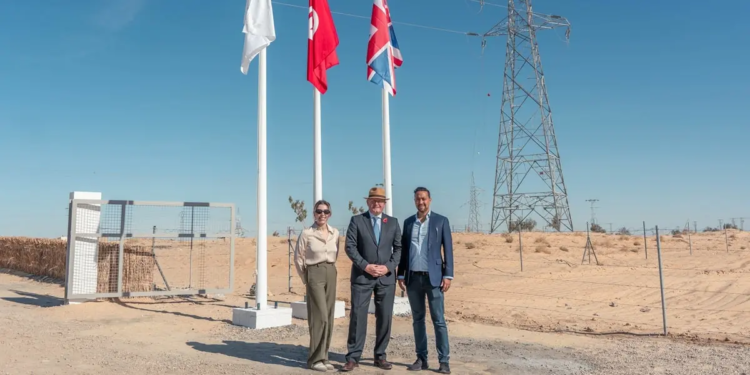Sometimes all it takes is a tour of the South to gauge the strengths of a partnership. In recent days, the British Ambassador to Tunisia, Roddy Drummond, visited Tozeur, Tataouine, Douz and Chenini. From this immersion, he brings back a story made of solar energy, digital innovation and threatened traditions. A rare cross between technological futurism and ancestral memory.
A mega solar project
In the Tozeur desert, the diplomat evokes a project which could change the scale of Tunisian-British ambitions: the “SoleCrypt” project, sometimes referred to as TuNur.
Its construction should begin “in a short time”, he assures. Commissioning is expected for 2027.
His role? Powering a Green Data Center installed in the north of the country, a bold bet that links clean energy, digital sovereignty and very high-speed connectivity. Connected to the Medusa cable, this data center would make Tunisia a digital node between Europe and Africa.
Mr. Drummond suggests that the first phase is only the beginning: the capacity of the site could be multiplied by ten. A project which, if it comes to fruition, would reposition Tunisia in the regional energy and digital game.
Tataouine: youth as a silent engine
Further east, in Tataouine, the diplomat observes another Tunisia. That of young developers, incubators and digital micro-enterprises who, despite the absence of heavy ecosystems, invent local solutions.
“Very encouraged,” he said.
The United Kingdom supports digital skills centers and is banking, in the long term, on a generation that is flexible and trained to navigate a world reshaped by artificial intelligence.
Chenini and Douz: at the heart of memory and women
In Chenini, the ambassador completely changes register. In this village suspended above the desert, he discovered a heritage documentation project carried out by the British Council, the University of Durham and the Tunisian INP. Drones, 3D modeling, climate surveys: high technology at the service of vulnerable heritage.
But it is the women who especially attract his attention.
“Guardians of local memory”, he says, fascinated by the transmission of weaving, natural dyes, stories and gestures which make up the identity of the region. The diplomat insists: supporting these women means preserving a part of Tunisian heritage which is fraying.
Digital as a space to protect
In another, more contemporary register, London is working with UN Women and the Tunisian Scouts to fight against online violence targeting women. Raise awareness, protect, encourage victims to “speak up”: the embassy places cyberharassment among its priorities.
“Aychek”, Kaak Warka and a country summed up in one word
In this interview, Roddy Drummond also opens up a little. He confides his taste for Kaak Warka, for couscous with stuffed squid from Sfax, for the Tunisian dialect where his favorite word is “Aychek”, which he finds softer and warmer than “Choukran”.
As for Tunisia, he sums it up in one word: “Diversity.” Diversity of landscapes, cuisines, cultures, horizons. A diplomatic, but sincere, way of explaining why he travels around the country so much.
Also read:








